- Home
- Michael Byrnes
The Genesis Plague Page 5
The Genesis Plague Read online
Page 5
‘Sure does,’ Jason agreed. ‘Hazo, come take a look at this.’
The Kurd passed the coiled cable to Jam and joined them.
‘What do you make of that?’
Hazo’s brow rumpled. After ten seconds, he shook his head. ‘I don’t know this . . . ah . . . but this rosette here?’ He pointed to a bracelet on the woman’s wrist. ‘This means she is like a god, or how you say . . . ?’ He fished for the word.
‘Divine?’ Jason surmised.
‘Yes, divinity. This says divinity.’
‘So she’s a goddess. Some kind of religious image.’
‘I think so. But not Christian. And Muslims would never allow these pictures. Very blasphemous.’
Pointing to the swirls on the image, Jason asked, ‘Is this supposed to be a river?’
‘Um, yes. I’d agree with that.’
‘And what’s this in her hands?’
Hazo shook his head. ‘A large fruit . . . um, no . . . maybe a container. These lines . . .’ Hazo said, tilting his head sideways to ascertain a meaning. ‘Maybe a light?’
‘Or something radiating from it.’
Meat gave Jason a surprised look. ‘What, like magic?’
He shrugged. ‘All right, let’s document everything. Meat, take some still shots, then keep the camera moving along this wall.’
‘Got it,’ Meat said.
For the next ten minutes, Camel worked more cable through the pipe to push the camera deeper and deeper into the passage. The images on the left wall had become progressively disturbing. The swirls rose with each ‘frame’, and Hazo’s early guess that this portrayed rising flood waters proved correct, when later images showed bodies and animals being swept ‘downstream’ in elongated swirls.
Most disturbing, however, was how the story’s depiction of the woman progressed. Her devotees from frame one had obviously had a change of heart, because the final frames showed men binding her, then leading her away with spears to the mountains. The final frame depicted the woman’s gruesome beheading.
‘She must’ve gotten too lippy with them,’ Meat joked as he saved the image as a pix file.
Jason shook his head. ‘Not funny.’
At the end of the storyboard, the wall was covered top to bottom in wedge-shaped hashes laid out in neat rows. Jason asked Hazo to take a gander at what it might mean.
This time Hazo was quick to respond: ‘That looks like a very ancient alphabet. Maybe from Sumer.’
‘Sumer?’ Meat asked.
‘The southern region of ancient Iraq,’ Jason told him.
‘Yes,’ Hazo concurred. ‘Sumerian.’
‘So what is this place?’ Meat asked. ‘One of Saddam’s old bunkers? He liked all this ancient stuff, right? Thought he was the reincarnation of a Babylonian king or something . . .’
‘Correct,’ Hazo said. ‘King Nebuchadnezzar.’
Jason shook his head. ‘We’ve seen plenty of bunkers. Nothing like this.’ He rubbed his neck while glancing over at what remained of the optical cable. ‘Let’s push the camera in as far as we can. See if we can spot anything else.’
With the camera reoriented straight, the hewn passage walls abruptly transitioned to rough, uncut stone. Three metres deeper, the camera approached a split.
‘Which way?’ Meat asked Jason.
‘Left.’
‘Keep it moving . . . steady push,’ Meat called up to Camel. Working the joystick, he commanded the flex cable to bend along the turn.
‘How far in do you think we are right now?’ Jason asked.
Meat looked over at what little flex cable remained. ‘Eighteen, twenty metres maybe.’
The light stripped the shadows off the tunnel’s crenulated outcroppings.
‘Wait . . .’ Meat said to Jason, pressing an index finger against the headphone speaker. ‘I hear something.’ He punched a button on the keyboard and the audio feed played over the unit’s built-in speakers. Sliding the headphones off, he raised the volume some more and listened intently. Jason and Hazo crowded in beside him.
First came the distinct chatter of voices, the dialect unmistakably Arabic. Two, maybe three different men, Jason guessed. The exchange was forceful, argumentative. To him, this was an encouraging development. The Arabs had yet to find a way out. Maybe this tunnel wasn’t so extensive after all.
‘They see the light,’ Hazo whispered, translating the exchange. ‘They don’t know what to do.’
The next sounds were metallic bolts sliding and clicking – weapons being readied.
‘Maybe we should pull the camera—’ Meat started.
On the screen, a glossy shape poked out from around the corner and winked in the light.
‘Is that a mirror?’ Jason said.
‘I think so,’ Meat said. ‘We should pull the camera out.’
‘Good idea,’ Jason said. ‘All right, Camel,’ he loudly called out, ‘let’s pull it back.’
But before Camel could react, the tiny flicker dropped off the unit’s screen just before one of the Arabs popped into view and stormed towards the camera. His rifle was safely slung over his shoulder, but between his hands was a melon-sized rock. His dirt-smeared face twisted into a snarl as he raised the rock up high over his head and lunged at the camera. The last image was a clear shot of the man’s grungy sandals. The last sound was a resounding thwack that rattled the unit’s speakers. Then the image snapped offline and turned to snow.
‘That’s not good,’ Hazo said.
‘Ouch,’ Meat said, cringing.
Camel began pulling out the flex cable in fathoms and Jam coiled the line back into neat loops. A minute later, the flattened tip popped out from the conduit, smoking and crackling.
‘Sorry buddy,’ Camel said to Meat in mock apology as he assessed the damage. ‘That thing’s toast.’ He tossed it to Jam.
‘At least we know they’re still in there, Sarge,’ Jam said.
‘I was thinking the same thing.’
‘Guys,’ Camel said, peering off in the distance. He spit a gob of chewing tobacco on to the ground and pointed out along the flatland. They all turned in unison.
Three kilometres out, a military convoy whipped a billowing dust cloud up into the blazing orange sunset. A UH-60 Blackhawk was flying random crisscrosses above it to scout the terrain.
‘Cavalry’s here,’ Camel grunted.
8
LAS VEGAS
Once the muted thumping inside the vault stopped, Randall Stokes sauntered to the wet bar, pulled a tumbler off the shelf, and poured two fingers of very expensive single-malt Scotch, neat. He withdrew a plastic pillbox from his jacket pocket, popped open the lid, and pinched out a pure white Zoloft tablet.
Putting the pill on his tongue, he raised the glass towards the vault door.
‘Cheers, Frank.’
He nipped at the Scotch and swilled down the dose of tranquillity. Then he went and sat behind the desk.
It hurt when good men – loyal men – were sacrificed for the greater good. Military life had a way of hammering into one’s head the notion that brotherhood always came first. Survival could be a singular effort, but lasting victory could never be. Fighters are made, not born. And that was certainly true with Frank Roselli.
Roselli was an extremely valuable asset. He’d perfectly coordinated the project in Iraq, which, given the mission’s complex logistics and broad scope, was no easy task. Though it was Stokes’s brainchild, Roselli had tackled recruiting the multi-disciplined talent who took the project from concept to reality. From around the globe, he’d assembled a team of renowned archaeologists and anthropologists and brought them into the middle of a war zone to unlock the greatest discovery in human history. It was Roselli who’d designed the ingenious security protocols and eliminated redundancies so that each scientist working on site knew only a piece of the cave’s intricate puzzle. Most impressive was Roselli’s brilliant handling of high-ranking members of Congress, the FBI and the armed forces, to bring together the fu
nding and technological know-how. And as far as the stakeholders were concerned, it was all an anonymous debit against the defence budget in the name of national security. So thorough was the mission’s cover that even the president’s eagle-eyed Cabinet members would give the appropriations a mere cursory glance.
Stokes and Roselli had been together since the beginning: through twelve weeks of boot camp at Parris Island and the gruelling fifty-four-hour Crucible march; side by side at the Emblem Ceremony, receiving their eagle, globe and anchor pins; at Marine Special Operations School learning the tactical art of irregular warfare.
Best friends.
Brothers.
Staring out the window, Stokes lost himself in the muddled reflections that danced across the cathedral’s reflective glass dome. The colours pinwheeled and shifted like a kaleidoscope. Entranced, his mind’s eye brought him back to the Kuwaiti desert: distant oil fields burning like torches against a night sky as black as oil; the paradoxical bitter cold of a sunless desert set ablaze. He could still feel the sixty-five-pound field pack weighing on his back, the ice-cold fifteen-pound M40A1 sniper rifle biting into his hands; the sand creeping down into his combat boots (despite three wraps of duct tape around the boot top). Even the choking stench of smouldering crude seemed fresh in his nostrils.
And there beside him, equally vivid, he could still see Roselli – forty pounds lighter, all muscle – the runt of the litter who had the piss and vinegar of a man twice his size. He’d witnessed Roselli beat a six-foot-two recruit unconscious with a boot for calling him Napoleon. Roselli was one tough mother who never gave up the fight. He’d even saved Stokes’s life by bayoneting an Iraqi soldier who tried to attack Stokes with a knife.
Now Stokes had repaid the deed by locking Roselli in an airless room, using the only viable weapon he could – one that stabbed much deeper than the bayonet: deception. Nothing noble about that, Stokes lamented.
He drained the Scotch.
Pushing down a welling sense of self-loathing, Stokes reminded himself that nothing could deter the mission’s success. So much was at stake. There was a new battlefront now – a new killing field. The last generation of fanatics was mostly desperate, idealistic kids blinded by radical religious teachings with no regard for any human life – infidels and innocents alike. But the leaders now operating behind the scenes to manipulate these malleable foot soldiers were by far the most dangerous enemy he’d ever encountered – a societal cancer that strove to destroy civilization. An enemy that wasn’t a country, didn’t wear uniform, had no generals or central power structure, and was fuelled by an ingrained hatred that no army could ever remedy. The industrialized world lacked the resources and mettle to effect any meaningful change in the Middle East. Left to conventional tactics, this modern war could last decades, perhaps generations. When Stokes had worked as a counter-terrorist operative, he’d seen little proof that anyone knew a viable long-term solution. One thing, however, was certain: in the end, only one side would remain standing.
‘It’s for the best,’ a soothing voice said from behind.
Startled, Stokes spun around in his chair.
There was no one in the room.
When would He present Himself?
‘Yes, it is for the best,’ Stokes agreed. ‘Frank’s work was vital . . . but he didn’t understand the grand design to which we aspire.’
‘Few do, my son.’
Stokes’s eyes darted back and forth, searching for an apparition. ‘They found the cave. You know that, of course. Will this jeopardize our work?’
‘Have faith. All is in accordance.’
The voice came at him from every angle.
‘And when will I know that it has begun?’
‘It has already begun. Do you not see the signs?’
There are no accidents, thought Stokes. ‘Yes, I see the signs. And the Rapture? When will it come.’
No answer.
Stokes scanned the room. He felt the presence dissipate. Gone.
9
BOSTON, MASSACHUSETTS
The snow was staging an encore as GSC Special Agent Thomas Flaherty turned his ’95 Chrysler Concorde off Huntington Avenue on to Museum Road. Rounding the corner, the car caught ice and began to skid. Shit! His heart went into overdrive. Gripping the steering wheel, he compensated by tugging it hard to the right. Steer into the turn, he told himself. Finally, the tyres caught salt and asphalt and he eased to a stop. He took a moment to catch his breath. Luckily, there’d been no cars in the oncoming lane.
‘Okay. Get it together.’ He accelerated nice and slow. Damned snow, he thought.
The promo banners hanging along the museum’s neoclassical cut-granite edifice were dusted with snow, but the words ‘Treasures from Mesopotamia, Sept. 21 – January 4’ were easy enough for him to make out.
The last time he’d visited the Boston Museum of Fine Arts had been during an eleventh-grade field trip hosted by the Boston Latin School. Not exactly a bragging point. Nowadays it was tough to find time for culture. At least that was the excuse he was going with.
When he steered to the kerb, his front right tyre thumped its way in and out of a pothole hard enough to make his teeth rattle. He rubbed the dashboard affectionately. ‘Sorry ’bout that, sweetie,’ he told the old war horse. He put the transmission in park, cut the engine.
From the centre console, he grabbed his BlackBerry, punched in the PIN code for his secure e-mail account, and accessed the urgent find-and-deliver order he’d received from Global Security Corporation’s Boston office. Only ten minutes ago, he’d received a terse phone call confirming that the museum was the asset’s current location.
The woman’s profile was a bit lengthy, so he read aloud to himself to drive home the key points: ‘Brooke Thompson. Born and raised, Orlando, Florida. Thirty-three. No children. Single . . .’ He paused and looked back at the attractive photo, trying to reconcile the contradiction. ‘Hmm.’ Single? He could only assume that she came with an ex-husband, excessive emotional baggage, two cats and a worn copy of Twilight. Otherwise, the facts simply didn’t compute.
The highly agreeable face, nonetheless, was easy enough to remember.
He continued down the bulleted list. ‘PhD in palaeontology, Boston College . . . professor at same . . . Middle East antiquities curator, Boston Museum of Fine Arts . . . award, award, award . . . blah, blah, blah . . . lives in the Back Bay on Commonwealth Ave . . .’ Satisfied, he dropped the BlackBerry into his coat pocket.
Bracing for the cold, he threw open the door on groaning hinges, swung his boots out into the slush, and got out from the car. The chill immediately cut into his bones. One of these days, he might remember to bring along some gloves, maybe a scarf too. If he wasn’t a serial bachelor, maybe he’d have someone at home to remind him of these things.
Stuffing his hands into his pockets, he set a brisk pace towards the visitors’ entrance.
Inside he headed straight for the admissions desk and discreetly asked the sixty-something female docent with a beehive hairdo where he might find museum staffer, Professor Brooke Thompson.
‘You’re just in time, she’s just gone up to present. Here, take this.’ She handed him a glossy programme. Sensing his confusion, she explained, ‘Her lecture is simply fascinating. Adorable too, wouldn’t you say?’ she stage-whispered.
‘Uh, yes, a real gem.’
‘Just around the corner, in the Remis Auditorium.’ She pointed and made a shooing gesture. ‘Hurry now.’
Flaherty slipped through the auditorium door and a museum employee immediately came over with a finger pressed against his lip in a hushing gesture. Without a word, he waved for Flaherty to follow him and set off along the auditorium’s dimmed rear to the left side aisle. He pointed to an empty end seat six rows down.
Keeping his coat on, Flaherty eased into the seat, surprised that the place was practically filled to capacity. It took some shifting around to get a clear view of the main stage, thanks to the towering guy s
eated directly in front of him who should have been in the Celtics locker-room at the Fleet Center.
There was a huge viewing screen above the stage that along with the tiered seating made him feel like he’d come to watch an IMAX movie. However, the still image projected on to the screen – some glossy brownish skull with a heavy brow ridge, maybe ape, maybe primitive human – wasn’t exactly blockbuster material.
When Flaherty’s gaze finally settled on the lecturer whose sultry voice buttered the sound system, his eyebrows went up.
‘Whoa!’ he exclaimed to himself.
Roaming freely in front of the stage’s central podium, clicker in her hand, clip-on microphone wired to the lapel of a form-fitting navy pants suit, was Professor Brooke Thompson. What he’d seen of her on the BlackBerry was only a headshot that showed wavy hair shaped to the shoulder, a long graceful neck and a face straight off a magazine cover. The complete picture was far more impressive. She seemed taller than the five-nine indicated in her profile, lithe with a perfect blend of tight curves that suggested a conscientious diet and rigid fitness regimen. Certainly helped explain the predominantly male turnout, he thought, glancing once again at the attendees.
Finally he began to focus on what she was saying. And once again, he was impressed. Brooke Thompson was an engaging speaker. Though Flaherty thought he wouldn’t give a rat’s ass about the seemingly arcane topic – listed on the programme as ‘Mesopotamia and the Origins of Written Language’ – she immediately hooked him.
10
‘So it’s around 10,000 years ago,’ Brooke Thompson went on, ‘when the most recent Ice Age finally comes to a close. The massive glacial sheets retreat to uncover the land, while the rapid melt-off causes a dramatic rise in sea levels. The most recent cycle of global warming, not attributable to emissions from SUVs and coal-burning power plants.’

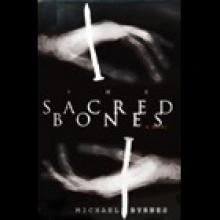 The Sacred Bones
The Sacred Bones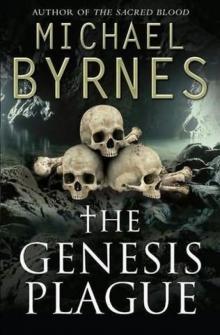 The Genesis Plague (2010)
The Genesis Plague (2010)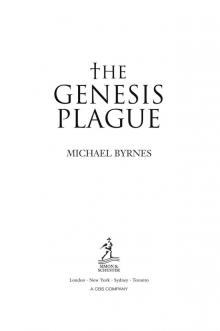 The Genesis Plague
The Genesis Plague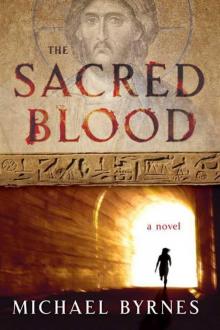 The Sacred Blood
The Sacred Blood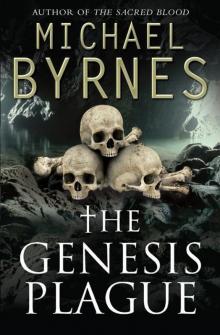 The Genesis Plague tf-1
The Genesis Plague tf-1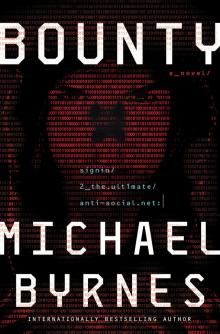 Bounty
Bounty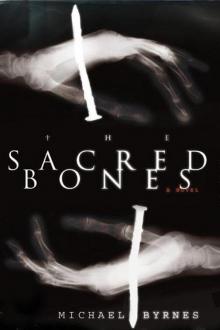 Sacred Bones : A Novel
Sacred Bones : A Novel